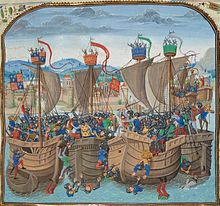| Revision as of 06:36, 9 May 2015 editPBS (talk | contribs)Autopatrolled116,854 edits No consensus for the addition of this tag. No evidence provided from policy or guidelines that "maintenance template stay until consensus is reached, not the other way around"← Previous edit | Revision as of 07:45, 9 May 2015 edit undoPeter Isotalo (talk | contribs)Autopatrolled, Extended confirmed users, Pending changes reviewers22,553 edits Undid revision 661518523 by PBS (talk)Next edit → | ||
| Line 1: | Line 1: | ||
| {{coatrack|date=May 2015}} | |||
| {{Other uses}} | {{Other uses}} | ||
| ] 1340 (BNF Fr. 2643, 15th century)]] | ] 1340 (BNF Fr. 2643, 15th century)]] | ||
Revision as of 07:45, 9 May 2015
| This article may relate to a different subject or has undue weight on an aspect of the subject. Please help relocate relevant information and remove irrelevant content. (May 2015) |



Melee (/ˈmeɪleɪ/ or /ˈmɛleɪ/, French: mêlée [mɛle]; the French spelling is also quite frequent in English writing), generally refers to disorganized close combat in battles fought at abnormally close range with little central control once it starts.
The French term was first used in English in c. 1640 (a re-borrowing of a lost Middle English melle, but the Old French borrowing survives in medley and meddle).
In military aviation, a melee has been described as "n air battle in which several aircraft, both friend and foe, are confusingly intermingled". In other words a dogfight.
Lord Nelson described his tactics for the Battle of Trafalgar as inducing a "pell mell battle", or a melee between the fleets, which he was sure would lead to a decisive victory, given the superiority of the Royal Navy.
See also
Notes
- ^ OED 2015.
- Kumar, DeRemer & Marshall 2004, p. 462.
- Fremont-Barnes 2005, p. 38.
References
- Fremont-Barnes, Gregory (2005), Trafalgar 1805: Nelson's Crowning Victory, Osprey Publishing, p. 3838, ISBN 978-1-84176-892-2
- Kumar, Bharat; DeRemer, Dale; Marshall, Douglas (2004), An Illustrated Dictionary of Aviation, McGraw Hill Professional, p. 462, ISBN 978-0-07-178260-9
- "mêlée n.", Oxford English Dictionary (online ed.), Oxford University Press, March 2015
{{citation}}: External link in|chapterurl=|chapterurl=ignored (|chapter-url=suggested) (help)
This military-related article is a stub. You can help Misplaced Pages by expanding it. |